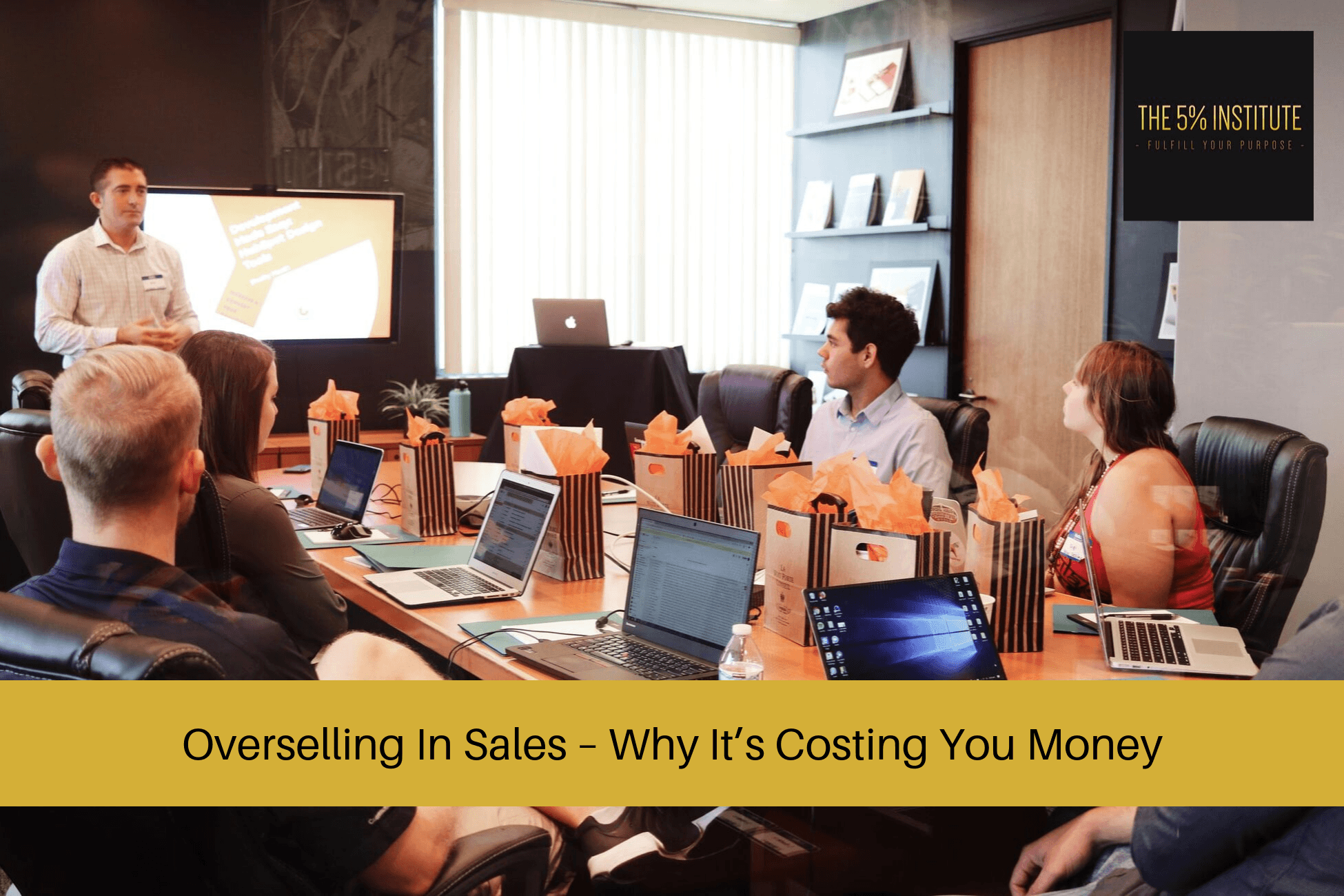
Overselling In Sales – Why It’s Costing You Money
Overselling in sales is a common mistake Sales Professionals and Business Owners make when speaking with their potential clients; and can in fact be something you accidentally do without knowing it.
But what is overselling; and why does it hurt your sales?
In this article, we’ll be looking at the two types of overselling in sales, why it damages your closing rate, and what you should be doing instead to avoid the issue.
Overselling In Sales – Why It’s Costing You Money
The Two Types Of Overselling In Sales
As mentioned, Sales Professionals commonly make two mistakes with overselling.
These two overselling issues are:
- Overselling what the potential client actually wants
- Overselling your solution, instead of listening out for their actual wants and needs
The First Type Of Overselling – Selling More Than They Want
The first type of overselling problem in sales, is trying to add so much value to your offer that your potential client ‘can’t say no’.
Ironically – this actually backfires and costs you the sale.
A lot of Sales Professionals and Business Owners have the wrong sales approach when selling their products or services.
Because they identify through their Sales Strategy Plan or Marketing Plan who their ideal customers are, they think they can present or pitch their products and services to this audience and these people will likely buy.
I mean – they are your ideal audience, and they would indeed benefit from your products, right?
In fact – this approach is wrong.
Although we all have various products, services, and different ideal audiences – it’s important to sell to what they actually want and need. Something that we may see as valuable, or something that another client of ours deems as valuable, may not be valuable for this prospect at all.
When we sell more than what they want, we make an assumption that all the benefits of our products and services will be valuable to them too.
What this does, is actually turn off your potential client from wanting to buy from you.
Why Does It Turn Them Off?
It turns them off in two ways.
First of all, they may think the reason why you’re adding in all these extra benefits and features could be because you’re creating a smokescreen about the ability and quality of your core offer.
They may be thinking hmm – if this product or service is that good, why the need to add in all the extra fluff and accessories?
Now I’m not saying extra’s or bonuses are a bad thing – we too add extra bonuses when people invest in The 5% Sales Blueprint; which is our flagship program. The bonuses are purely bonuses as a thank you.
We don’t take the focus away from our core offer – and its important that you don’t either.
It Can Be Perceived That You’re Not Listening Out For Their Actual Needs
When your potential client is giving you their insight about where they’re currently at, their concerns and issues, and where they ideally want to be including their desires; they want a Specialist to give them advice and prescribe exactly what they need to have their issues and pain points solved.
When you go to a Doctor; they ask you what your symptoms are, run a few tests, and prescribe exactly what you need.
They don’t tell you to take one thing, and then offer a few more things – and tell you if you buy now they’ll take an extra 10% off!
Positioning yourself and overselling in this way is detrimental to your sales and is a common issue with Sales Professionals and Business Owners.
Fortunately for you – your competitors are doing it too.
And also, fortunately for you – you’ve found this website; and you can learn what to avoid, and what to do to more of to position yourself as a Specialist, and not just another commodity.
Please remember – value is only relative to their exact pain points, problems and needs. When you’re overselling, you’re not paying attention and are perceived as devaluing what they’re telling you.
To learn more about this, read the related article below.
Related article: Building Value In Sales Conversations – A Step By Step Guide
Overselling Your Solutions – Instead Of Listening Out For Their Needs
We’ve slightly touched on overselling your solutions and understanding that value is relative to what they want and need.
What we’ll look at now, is another common mistake that contributes towards overselling.
This is called premature presentation.
As per our article in Entrepreneur.com, many Sales Professionals meet with potential clients, and follow this method:
- Build rapport
- Present their offer or solution
- Ask for questions
- Ask for the sale
- Handle objections
This model; although very popular, is actually very broken – and something that should have been left back in the 1980’s.
We can only rightfully sell and ask for the order, once we truly understand what our potential client actually wants and needs.
We may we speaking with them and assume that they want our solution.
But unless we actually dive deeper by asking open-ended questions, we can’t truly find out whether what we’re selling is a good fit for them or not.
Instead, learn and use the following sales process so that you can maintain rapport, build a better relationship, and close more sales:
- Rapport
- Setting pre-frames
- Open ended, trial closing questions
- The pain process
- Future pacing
- Talking about money
- Presenting
- Handling objections
- Asking for the sale
Notice we only present long after we’ve learnt everything we need about the potential client. This ensures we understand what value actually is and means – and maintains an extremely high closing rate.
To learn more about the sales process in more detail, check out the related article below.
Related article: The Sales Process – A Step by Step Guide
How To Know Whether You’re Going Overboard
So far we’ve covered the two types of overselling in sales, and what you can do to prevent it from happening.
Now let’s learn how you can pick up whether you’re overselling or not.
They Become Argumentative
If a potential client starts becoming argumentative; you must be talking and presenting too much; and not asking enough questions.
Asking questions is the key to sales success, and the best way to help someone sell themselves.
To learn how you can help someone sell themselves on your products or services, check out the two related articles below:
Related article: Trial Closes – A Step By Step Guide
Related article: Tie-Down Sales Techniques – Your Ultimate Guide
They Start Becoming Distracted
Another quick thing to look out for when asking questions or talking to your potential client, is how distracted they seem to be during the conversation.
If they start off the conversation quite focused and slowly start becoming distracted during your questioning and conversation, you may be overselling and not listening enough to their responses.
They Want To Hurry The Conversation Along
To use a similar example as before; when’s the last time you went into the Doctor’s office and rushed him or her to hurry along with their diagnosis? If you were serious about your issues and pain points, you wouldn’t have, would you?
The same could be said for your potential clients.
If your potential client wants to rush things along, you may be overselling.
Take a step back, and ask open-ended, deep diving questions instead.
Final Thoughts
Overselling is a common mistake with Sales Professionals and Business Owners, but it doesn’t have to be.
Learn and implement this guide, and you’ll position yourself as a Trusted Specialist – and win more sales.
If you’d like to learn how to consistently close more clients without being pushy or salesy, register for our 7 day sales challenge here.
Want To Close Sales Easier?
Are you committed to closing sales a lot easier, and consistently?
If so, you should check out our self-paced and affordable online sales training program; The 5% Sales Blueprint.
It’ll give you everything you need to close sales consistently.
To learn more, simply click on the link below for more information.
Our Online Sales Training Program – The 5% Sales Blueprint.



